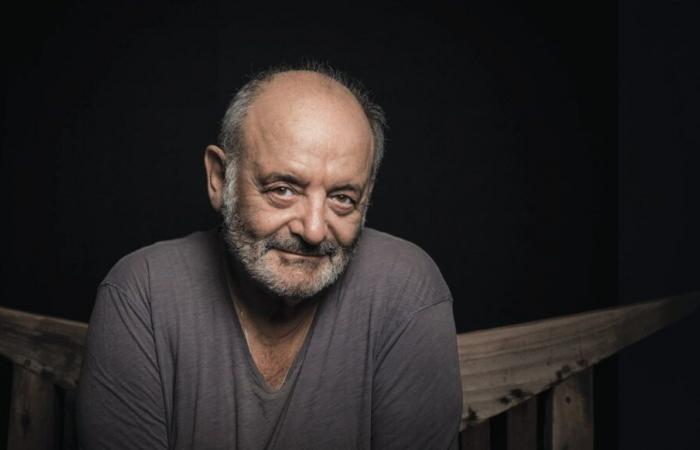Far from the media noise, Louis Chedid continues to release enchanting albums in « artisan » et « amateur » – he cares – about the song. “Dreamer, dreamer” is no exception to the rule and announces the color: an outlet for the gloom, almost a provocation, a challenge launched to the detractors of “good feelings”. An album that not only feels good, but recharges the batteries, more airy than the previous ones, surrounded by bucolic accents. At the age of 76, the humanist singer still allows himself to dream while knowing how to keep his eyes open to the world.
With this album, you celebrate happiness and joy, all things that are rather mocked today. Do you think you made an album that went against the grain?
Let's say that I don't want to contribute to the general gloom, but rather to lift people up. Some may say these are good feelings. But it's still better than hatred. I know what I want to convey, rather positive things while not ignoring reality.
However, you write “in reality I feel in exile”…
Absolutely. Reality as we imagine it or rather as it is delivered to us. Maybe I'm lucky, but the majority of people I meet are caring and want to be happy. I think the norm is more towards those who seek positive things.
You say you left 70% of the songs you wrote while preparing this album. What makes us ultimately keep a song?
The impression that it can represent the two years we lived before the release of the album. And when I say to myself: hey, that's something that can survive in ten years. It's very subjective, but I think about the sustainability of things. It's not a question of posterity, I don't care. But a good artistic object must be able to be listened to or seen today as in decades from now.
I've been lucky to have written songs that marked their era, some of which are 40 years old, like “So Be It”. I never tried to be fashionable, but to make songs that last. Of course, out of the total, there isn't even 10%, but that's not bad!
Songs that last certainly shouldn't stick too closely to fashion, but that doesn't stop them from hitting the news. “Anne my sister Anne”, for example, where you castigated the resurgence of far-right ideas in 1985… And on this album there is “Comme vous”, a song where you criticize hatred of migrants. What made you write it?
When I hear some people say that migrants are only thieves or criminals who come to steal French money… One of my ancestors had to leave Lebanon for Egypt at 17, forced and forced, because his whole family was massacred. In general, we do not leave our country out of pleasure or to annoy the host country, but because we get bombs in the face or because our children risk dying, or simply because we don't I have no choice.
I can understand that this creates problems with migratory flows, but we combine all that to feed a kind of political statement which consists of saying that they are all bandits, we really have to have a chickpea in our heads. Or be absolutely cynical. And it can happen to anyone. We live in a country that has been at peace for a long time, but we never know what could happen.
Can a song, if not changing the world, make it move?
A song says out loud what many people are thinking quietly. It's already not bad. It's the same thing when you read a book and you say to yourself that that's exactly what you think.
Isn't it rarer today to hear these kinds of songs?
It's rare to hear them, but there are certainly many that are written. Maybe because there is a kind of censorship. But these are difficult songs to get right. In “Anne my sister Anne”, the music is not in the mood of the text. And if there hadn't been this paradox between the music and the text, it might not have worked as well.
You are the child of an old Lebanese family. How are you experiencing what is happening there now?
It's difficult to talk about it when you live in France. But obviously, for us, it’s dramatic. It is a country and above all people that we love deeply. The Lebanese people are rather peaceful and very cosmopolitan. Once again, he finds himself in the trap, and it's been going on for at least fifty years. It’s terrible and it needs to be said. But is it of any use? Our jobs help to light up the shadows and the gloom. But, obviously, that doesn't solve any of the basic problems…
As you recently passed the fifty-year career milestone, what are you most proud of?
Longevity. The most difficult thing in these jobs is to last. When our generation started with Jonasz, Souchon, Sheller, there were many, many people on the starting line. If we're still here today, it's because we made some good songs and people continued to be interested in us.
Also for having led my boat in my own way, by following a line without doing anything, by not listening to certain people in the profession who pushed me to go on TV shows where they force you to laugh or to say immodest things.
And there is this family of which you have somehow become the patriarch since the death of your parents, your musical children Matthieu and Nach and your partner, Emma, whom you invited on this album. Is this also a source of pride?
They all have their originality and they all do something wonderful. It was not at all me who pushed them into this, I would never have done such a thing. It surely came from seeing us, as I myself saw my mother writing, telling me that it must be incredible to live like that. There is something very beautiful about the success of all of them. And it brings us together a lot to have the same interests.
Your mother, the poet Andrée Chedid, is always up to date. We see her on theater posters and many public establishments now bear her name. What did she leave you?
Many things and certainly a form of humanist writing. She wrote a lot about life, death and feelings. She had a way of approaching life in freedom. And not to want everything at any price, to have measured ambition.
You end the album with “The Cloud Train”, a song that evokes death and reincarnation. Is this a question that bothers you?
It has been essential from the start. When I was younger, it really worried me. I made dark songs. Then I ended up thinking that something really happens afterwards and it doesn't all end. So I'm calmer at that level. But I love this thing called life, because I've been lucky enough not to have to complain about it too much.
Unlike teenagers from Lebanon, Gaza or Ukraine who get bombs on their heads. There are so many terrible things happening every day that we should bless heaven to live in a country like ours.
Dreamer, Dreamerby Louis Chedid, Pias.
Closer to those who create
Humanity always claimed the idea that culture is not a commoditythat it is a condition of political life and human emancipation.
Faced with liberal cultural policies, which weaken the public service of culture, the newspaper reports on the resistance of creators and all cultural personnel, but also on the solidarity of the public.
Unusual, daring and singular positions are the hallmark of the newspaper's culture pages. Our journalists explore behind the scenes of the world of culture and the genesis of the works who make and shake up the news.
Help us defend an ambitious idea of culture!
I want to know more!






